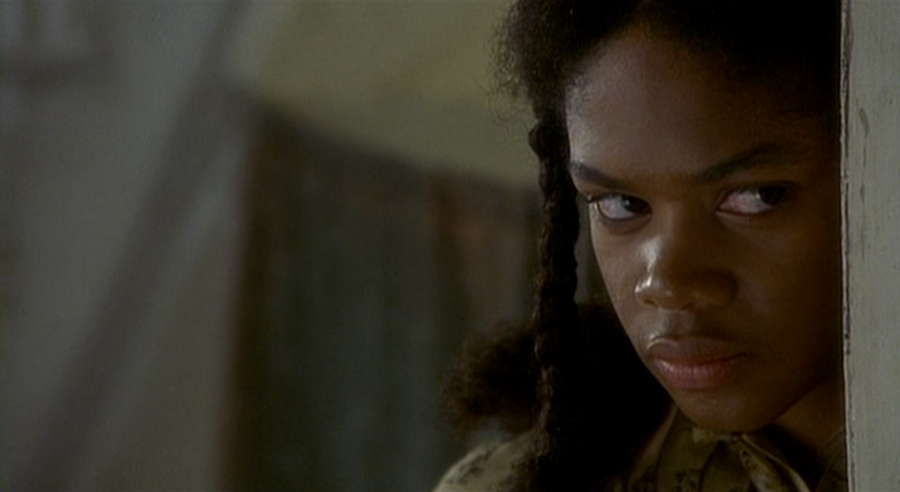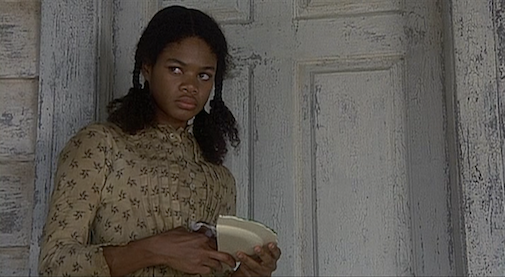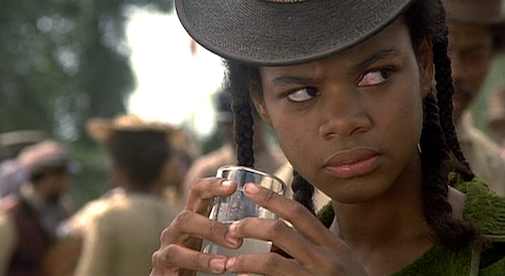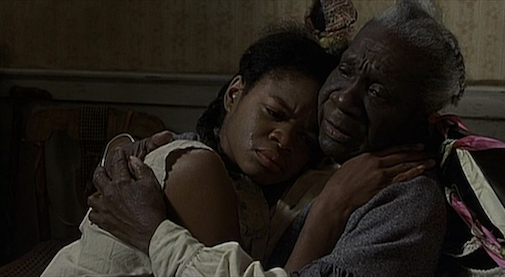1998: The women of "Beloved"
 Saturday, July 10, 2021 at 2:38PM
Saturday, July 10, 2021 at 2:38PM We're revisiting the 1998 film year in the lead up to the next Supporting Actress Smackdown. As always Nick Taylor will suggest a few alternates to Oscar's ballot.

Another week, another lone Costume Design nominee that deserved far better attention than it got. Yes, Jonathan Demme’s Beloved is visibly uneven in several passages, to include the entire last hour. Yes, there’s a whole lot of discourse around Oprah as producer/actress/cultural icon at the time that I completely missed. Broadly speaking, it’s so disappointing that Toni Morrison’s works have had so few adaptations for screen, even as the author herself was a constant source of insightful interviews and the focus of several documentaries. But even on its own terms, Beloved is a genuinely risky, textured piece of filmmaking, honoring Morrison’s astounding novel without softening its most difficult themes. It’s also filled to the brim with fiercely etched performances from its supporting actresses. Kimberly Elise, Thandiwe Newton, LisaGay Hamilton, Beah Richards, all approach tremendously difficult roles with ferocity and candor...
Beloved’s portals through past traumas and potential escapes makes it hard to summarize, even as the film organizes these events in fairly understandable ways. By the time the narrative properly kicks off, Sethe (Oprah Winfrey in the present and LisaGay Hamilton in the past) has been living for eighteen years on a small plot of land in Cincinnati. An ex-slave who escaped to freedom with her infant children, Sethe was meant to travel with her husband Halle but never saw him at the rendezvous spot. She traveled to Halle’s mother Baby Suggs (Beah Richards), a former slave whose freedom he bought, and who was a preacher in Cincinnati before passing a few years after Sethe arrived. Sethe’s house is haunted by the ghost of her oldest daughter, who died horribly sometime after she arrived in Ohio. Named “Beloved” on her headstone, her spirit had driven away Sethe’s sons before Baby Suggs died, and she continues to torment the house with her violent temper.

The only child still living with Sethe is her youngest, her eighteen-year old daughter Denver (Kimberly Elise), who was born just as her mother crossed the border from Kentucky into Ohio. Denver has spent her whole life haunted by her mother’s ghosts, and flits about the house like a sullen, abused child, forever skirting unwanted attention. She’s terrified of being in her own home, barely fending for herself while the world outside her house doesn’t even know she exists. When we first see Denver she’s at the end of her rope, and lashes out at her mother before crumpling onto the floor.
What’s less clear, deliciously so, is whether Denver’s suspicion of Sethe’s friend Paul D (our newest Jean Hersholt honoree, Danny Glover) is bound up in her supernatural crisis, or a more mundane fear of losing her mother’s attention to a man she has such complex, muscular history with. Elise has a fantastic knack for broadcasting clear, potent, yet undemonstrable thoughts and emotions without always being transparent about her motivations. Sometimes, as when Paul D buys her sweets at the fair, Elise shows that Denver knows he’s trying to soften her up, and is won over by his earnestness. She’s openly considering whether the more social lifestyle he seeks to cultivate for the three of them is worth her trust, and she conveys this in only a few moments, with the clarity and economy of a silent film star.

In other scenes, Elise refuses total psychological transparency, raising interesting questions about Denver’s perspective. When she sits on her front porch with the few scraps of unburnt food she could salvage after another visit from the spirit, what does she think of the people traveling up and down the road in front of her house? Is she envious of their freedom or unsure of how to join them? Or is she put off by their unwanted attention? As with Toni Collette last week, Elise avoids reducing her character to an audience surrogate, and Beloved is an infinitely richer experience for the unflagging precision in how she wears Denver’s interiority.
But Beloved is not complete without its title character, who makes one of the most unforgettable entrances to ever grace the movies. A young woman (Thandiwe Newton) dressed in some barely-worn fineries wades out of a swamp and travels to Sethe’s house, intermittently resting before passing out on her doorstep. Sethe, Paul D, and Denver haul her inside and give her a glass of water, which the stranger ravenous gulps down. Sethe asks her name, and she croaks out “Beloved”, one awful letter at a time as water and drool drip from her mouth.

Playing a character without many literary or cinematic predecessors to draw upon, Newton’s interpretation of Beloved is not some placid figure to be blithely revered but a feral child who reveals herself through impulsive, sometimes relentless wants and voracious appetites. Her questions about her new family’s history are expressed with dim sincerity, yet she’s too forceful in her actions for them to completely indulge her or take her desires for granted. Every part of her body moves like she’s still learning how to use it. Her voice, originally harsh and bullfroggy, settles into an airier, equally strange register, like she sometimes forgets to use her tongue to push out air.
Newton’s technical prowess is a crucial, binding element for how she approaches her character, even as you can’t help gawking at how controlled she is. I haven’t found any interviews that clarify how this particular, frankly unusual interpretation of Beloved was decided upon, and I hesitate writing this in such a way as to give Newton total credit for what must have been a delicate collaboration with Demme. Still, Newton's contribution is undeniable. Her Beloved is constantly jostling her family into uncomfortable remembrances, or examining new sides of themselves. She also provokes some of Elise’s best work. Denver treats her newfound friend as the sister she never had while giving her the doting, motherly attention she herself desperately needs. Denver is also the first person to suss out that Beloved is actually the ghost of the daughter Sethe lost, and Elise distills all of these truths for the camera without making a fuss.

Elsewhere, LisaGay Hamilton and Beah Richards do tremendous work in a handful of flashbacks to Sethe’s escape to Ohio and early days of freedom. Hamilton, as young Sethe, puts her body on the line for some of Beloved’s most upsetting setpieces. Shot in close-up as her back is whipped to shreds, barely conscious as she lies pregnant in a Kentucky forest with torn-up feet and bruises all over her body, giving birth in a rickety row boat - it’s hard not to consider the cost this had for Hamilton to enact, yet her rendering of Sethe's physical and spiritual anguish is painful to witness. Her sheer, unfettered joy at being with her children again in free country, and the resolute conviction on her face as she takes grave action to protect them from Sweet Home agents, are among the most visceral images in the whole film.
Richards, as Sethe’s mother-in-law Baby Suggs, carries her body with a vitality that never overrides the somewhat stiff way she moves at her joints, embodying both the torturous labor that characterized her history and the evangelical vigor that defined her to her community. Her face and voice are so emphatically expressive that her love and strength are endowed with real, toiled history. I wish the blocking of her sermons didn’t hide her face so often, as though turning her into a concept rather than the flesh-and-blood figure Richards is giving us, but her performance never diminishes. Hers is arguably the most stock role in the film, yet Richards is such a singular presence - and her choices as an actress illuminate Baby Suggs so vividly - that she becomes as memorable as her co-stars. She’s the purest wellspring of human spirit in Beloved, and it benefits tremendously from the warmth she gives it.

After making such indelible impressions, Hamilton and Richards are largely absent for the film's third hour. In general, Beloved loses some steam once we learn how Sethe’s daughter died, and the actors are sandbaggde a bit as a result. Newton functionally stops having an arc, and though she saves Beloved’s soured attitude from being the about-face that would’ve come from a more martyred interpretation, she and the Demme's work a little too hard to dramatize this newly parasitic figure. Ultimately, Elise’s already-strong performance emerges as the film's backbone for its final stretch. Denver’s disappointment in her mother and Beloved, as well as a newfound need to get money for food, finally forces her to venture out into the world, and her emergence into the world is a sight to behold. Watching her interview for a safe, well-paying job is among Beloved’s most gratifying scenes, and for Elise to achieve this in the least commanding section of the film is a testament to her skill.
In truth, all four of these women haunt Beloved, showing the vastly different ways people can be shaped by the histories, relations, loyalties, and tragedies they experience, in life and in death. Occasionally it can be hard to determine how to best honor a challenging, uneven film like this one. But with so many bold, risky performances to its name, Beloved could and frankly should have owned this year’s supporting actress category.




Reader Comments (16)
This was a great write up,if you get into this film it's a hypnotic experience,bold and daring with Oprah giving us Oscar worthy acting and Elise a strong quiet force,i'm more at home with Thandie now but back then I wasn't,Danny Glover is the weak link here.
This movie is really good, the direction is great and the performers give unforgettable moments, even Oprah is good, but the MVP (in my opinion) is Newton: from her first scene to the last, she creates a character that is not real but makes such a strong impression, she seems part of a realism magic novel.
Kimberly Elise and Beah Richards give my favorite performances in the film, but it's hard to deny that Newton achieves something entirely otherworldly in her performance. This is a very hard film to watch, but I've seen it several times and each viewing is more rewarding than the last.
The film adaptation of Beloved is an artistic failure that sanitizes one of the greatest novels of our generation.
Nobel laureate Toni Morrison uses the framework of the true story of former slave Margaret Garner to explore the legacy of slavery in this country. In a riveting sequence, Schoolteacher arrives in Ohio to reclaim his property, Sethe and her four children. To prevent her children from returning to unspeakable, horrific abuse, the young mother begins to slaughter her children. Schoolteacher is the only purely evil character in the novel. He carefully justifies racism that explains slavery and sees murder as a solution to social problems.
Specifically in the novel Schoolteacher sees the aftermath of Sethe’s violence against her children and remarks that this is the result of cruelty to animals. Morrison opened our eyes to the terror of slavery and provides understanding of the choice to murder your children rather than send them to endure such agony for a lifetime. In the film, the schoolteacher views the aftermath of Sethe’s violence and a single tear falls down his cheek.
That moment is one of many artistic betrayals that undermine Morrison’s intent to shine a bright light on the realities of slavery. The screenplay was written by Ghanaian actress, Akosua Basia, best known for her film portrayal of Nettie in The Color Purple. The script was then given to two white male screenwriters Richard LaGravenese and Adam Brooks by white director Jonathan Demme for revision. The film, it’s power diluted in an effort to make the adaptation commercially viable to a white audience, did not deserve recognition.
TLDR, what was your ranking of the supporting actress cast of Beloved?
Beloved, to some extent, suffered from the reaction to Spielberg and The Color Purple. As Danny Glover himself once said in the early 90s, "The Color Purple is a good film, not a great one." Some of the critical response came from the same belief that white male filmmakers didn't know how to make stories for and about black women. It was not fair to the quartet of actresses, especially Thandie Newton and, to a lesser degree, Kimberly Elise. To be fair, reputable film critics were able to separate the performance from the film and reserved high praise for Newton and Elise.
I think of Beloved as an ambitious, noble failure, but agree that Newton and esp Elise were really quite remarkable in it. Morrison's books are wonderful but difficult to capture onscreen; I think they really to have the right director to handle the often ethereal material. Demme tried hard but wasn't quite up to the task, I agree with others that an African-American director might well have had a better feel for Morrison's vision. At any rate, a wonderful piece, Nick.
I was charmed by Beloved when I watched it, even if it wasn’t exceptionally received. Newton and Elise are outstanding
@markgordonuk - Thank you! I think all the performances are pretty strong, even if I imagined Alfre Woodard subbing in as Seth every now and then. Agreed on Glover, though I think Paul D generally suffered a bit from this adaptation.
@Cafg and thefilmjunkie - It’s such a gutsy interpretation, and I’m floored by how much control Newton has over it without making the character into empty spectacle. Genuinely special work, though I really treasure what Elise, Hamilton, and Richards achieved with their own, very cinematic forms of physical expressiveness.
@James - That specifically was one of the strangest omissions of context from the novel. There are absolutely passages of the film that take us having read the novel for granted to carry us through it, and everything after the scene you described is a bit less effective than the previous two hours. but there’s a lot to Beloved that strikes me as really worthwhile and risky. Maybe I’m just equating the film’s very physical renderings of trauma with non-commercial prospects, but I wouldn’t call the commitment to the character’s psychic and bodily scars, the outlandishness of Newton’s performance, or anything about the flashbacks particularly diluting of Morrison’s work or easy to sit with. It’s certainly a flawed adaptation, but I wouldn’t say softening the material is its ultimate sin.
@Get2tha - Elise, then Newton, then Hamilton and Richards neck and neck. All fabulous.
@Lenard Weinstein, Rob, and Mirko - It was very gratifying to read through the reviews for Beloved and see how often the actors were singled out, regardless of the overall review the film got. The consistent recognition for Elise and Newton was especially nice. I’d definitely put Beloved a notch or two above Color Purple, which feels like it’s goosing Walker’s material for crowd-pleasing purposes often enough that I can’t get totally in its corner, even if there’s plenty to treasure. I’d also argue a bit in favor of Demme’s direction, which feels more integral to guiding the robust ensemble work and different tensions Beloved elicits in consistently rewarding ways than Spielberg does with his film. All that said, I’ll never not be curious what Julie Dash could’ve done with this, or when an African American director will get a real crack at one of Morrison’s novels.
I watched it late last year and it hit me in ways that I didn't expect. More than just being a story about slavery, this is a story about the trauma that slavery causes. In the wake of BLM and other movements, the story was even more impactful. That struggle to find joy in a life defined by pain and loss was a pretty emotional viewing experience, and elevated my opinion of a film I already thought was pretty good.
That being said, it's far from perfect. The film is overly referential to the book, and suffers for it. There's no way any adaptation could capture the complexity and nuances of Morrison's writing, and the films may have been better served by being more freely adapted. I think the performances are exceptional top to bottom, but as good as Oprah is, she's a distraction. Especially in '98, when she was arguably at her height. She was (is) too much of a star to disappear into any role at this point. That's why she's so amazing in something like The Butler, where the role plays on that star power. Sethe needed someone who could truly disappear into the role, and maybe someone just a but younger to play role all the way through the movie (though you'd hate to lose the excellent work by Lisa Gay Hamilton).
It annoys me how dismissive people are of Demme directing Beloved. His liberal leanings and background as a documentarian inform the visual texture of the piece including the casting. Aside from Oprah who totally made a weighed down by intentions and expectations to fulfill her own desire for Oscar glory artistic blunder. But like David Lynch's Dune there is so much correct stylistically.
There's another Black movie from 1998 that could also fill the supporting actress category -- How Stella Got Her Groove Back -- Whoopi Goldberg, Regina King, and the late Suzzanne Douglas.
Richards is just astonishing.
Thanks for this. I only saw the movie once, when it came out, and remember thinking it was about as good an adaptation as we could probably get of a book I considered almost unfilmable. In retrospect, I think it's underrated. And yes, the performances are terrific.
Kinda late to thia post, but thank you for writing it up. I sobbed for days after seeing BELOVED. It made me realize how much I did not know about the history of racism and torture in this country. I started reading Toni Morrison and others to educate myself.
I once had the chance to chat with (the very shy) Jonathan Demme, and I could have talked about so many of his films, but I just thanked him for making BELOVED and told him how much it meant to me, how much it showed me, how much it taught me.
I love this movie, but had also read the book and knew of Morrison's penchant for magical realism. I am not sure that a lot of people who had not read the book got that. Newton's performance in particular seemed to baffle people at the time. But I think this movie is so underrated and has so much good stuff in it.
They really botched the release of this film. Going wide on 1200+ screens was a disastrous decision for a film whose release required a much more delicate approach.